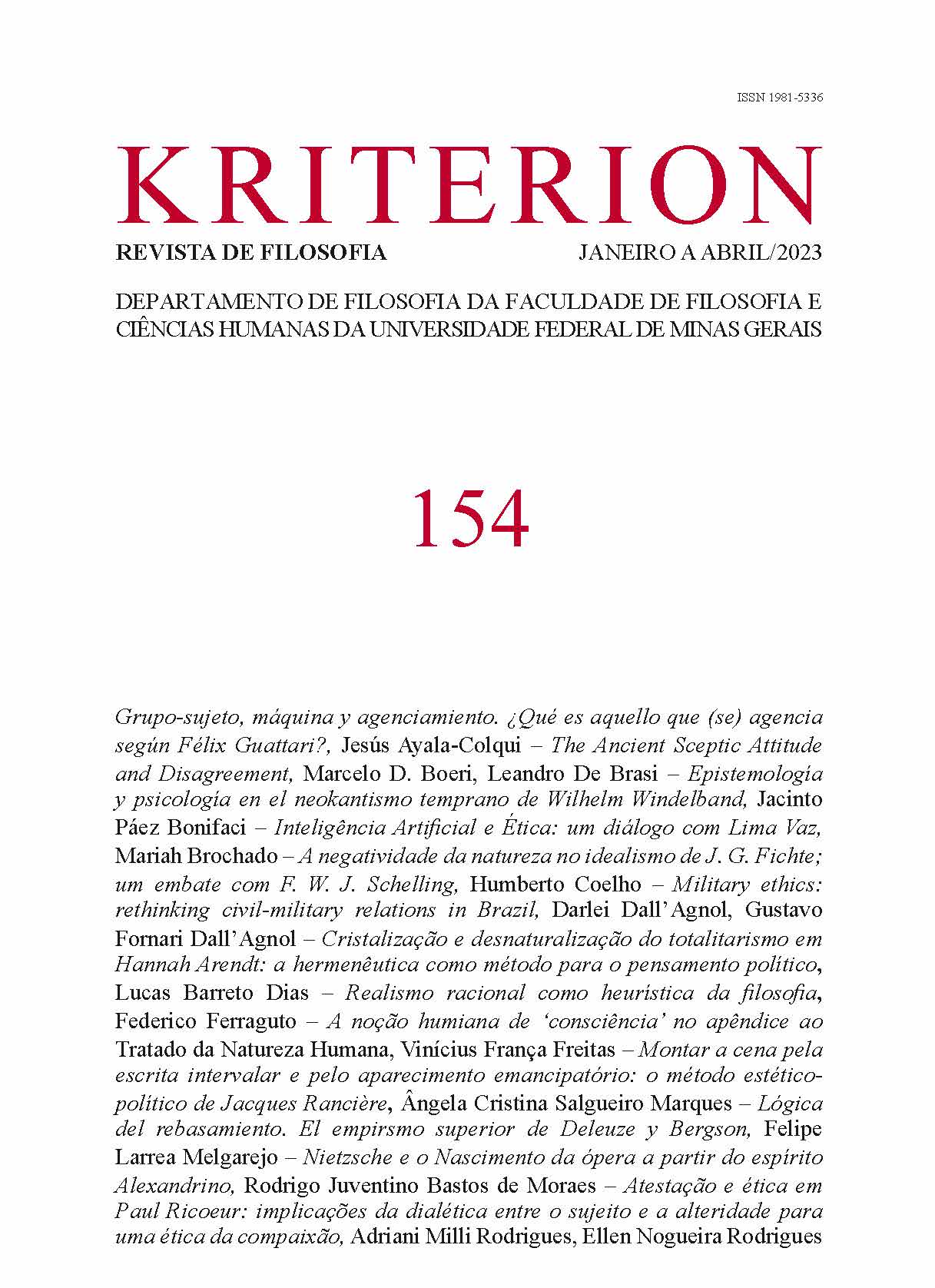CRYSTALLIZATION AND DENATURALIZATION OF THE TOTALITARIANISM IN HANNAH ARENDT
HERMENEUTICS AS A METHOD FOR POLITICAL THOUGHT
Keywords:
Meaning, Understanding, Denaturalization, Crystallization, TotalitarianismAbstract
In this article, I emphasize how Arendt mobilizes the notions of understanding and meaning in an original way to guide her interpretation of political phenomena. It is worth noting that the criteria that the author thinks for the comprehensive activity are configured as an undeveloped hermeneutics, but which appears as a background for her thinking. The starting point deals with the conceptual distinction that she makes between truth and meaning, the
latter as the constant and unending goal of the comprehensive activity. Then, from Arendt’s Thought Diary, I rescue the notions of denaturalization and crystallization as hermeneutic perspectives based on the notion of meaning, instead of the causality criterion. Finally, I explain how totalitarianism can be read under a hermeneutic view.
Downloads
References
AGUIAR, O. A. “Filosofia, política e ética em Hannah Arendt”. Ijuí: Ed. Unijuí, 2009.
____. “A tipificação do totalitarismo segundo Hannah Arendt”. Doispontos, Curitiba, São Carlos, Vol. 5, Nr. 2, pp. 73-88, Outubro 2008.
AMIEL, A. “Hannah Arendt Política e Acontecimento”. Lisboa: Instituto Piaget, 1997.
ARENDT, H. “Origens do totalitarismo: anti-semitismo, imperialismo, totalitarismo”. Trad. br. R. Raposo. São Paulo: Companhia das Letras, 1989.
____. “Philosophy and politics”. Social Research, Vol. 57, Nr. 1, pp. 73-103, Spring 1990.
____. “Hannah Arendt-Martin Heidegger: correspondência 1925/1975”. Org. U. Ludz; Trad. br. M. A. Casanova. Rio de Janeiro: Relume Dumará, 2001.
____. “Essays in understanding: 1934-1954. Formation, Exile and Totalitarianism”. Edited by J. Kohn. New York: Schocken Books, 2005.
____. “Diario filosófico: 1950-1973 – Volumen I”. Editado por U. Ludz e I. Nordmann. Trad. R. Gabás. Barcelona: Herder Editorial, 2006.
____. “Compreender: Formação, exílio e totalitarismo”. Trad. Br. D. Bottmann. São Paulo: Companhia das Letras; Belo Horizonte: Ed. UFMG, 2008.
____. “A condição humana”. Trad. Br. R. Raposo, revisão técnica: A. Correia. 11ª ed. Rio de Janeiro: Forense Universitária, 2010a.
____. “A vida do espírito: o pensar, o querer, o julgar”. Trad. br.: C. A. R. de Almeida, A. Abranches e H. F. Martins. 2ª ed. Rio de Janeiro: Civilização Brasileira, 2010b.
____. “Pensar sem corrimão: compreender 1953-1975”. Trad. Br.: B. Andreiuolo et al. Rio de Janeiro: Bazar do Tempo, 2021.
BIRULÉS, F. “Una herencia sin testamento: Hannah Arendt”. Barcelona: Herder, 2007.
BORREN, M. “Amor Mundi: Hannah Arendt’s political phenomenology of world”. Amsterdam: F & N Eigen Beheer, 2009.
CORREIA, A. et al. “Dicionário Hannah Arendt”. São Paulo: Edições 70, 2022.
DI PEGO, A. “La comprensión como perspectiva metodológica en Hannah Arendt”. Andamios, Vol. 13, Nr. 31, pp. 61-83, mayo-agosto 2016.
DILTHEY, W. “Introdução às ciências humanas: tentativa de uma fundamentação para o estudo da sociedade e da história”. Trad. br. M. A. Casanova. Rio de Janeiro: Forense Universitária, 2010.
ECCEL, D. “Debate sobre o totalitarismo: a troca de correspondência entre Hannah Arendt e Eric Voegelin”. Lua Nova, São Paulo, 101, pp. 141-174, 2017. Doi: http://dx.doi.org/10.1590/0102-141174/101.
GADAMER, H.-G. “Verdade e Método I: traços fundamentais de uma hermenêutica filosófica”. Trad. Br. F. P. Meurer. 15. ed. Petrópolis-RJ: Vozes; Bragança Paulista: Editora Universitária São Francisco, 2015.
HEIDEGGER, M. “Ser e Tempo”. Trad. br. F. Castilho. Ed. Bilíngue (Alemão e Português). Campinas: Editora da Unicamp; Petrópolis: Vozes, 2012.
HINCHMAN, L. P.; HINCHMAN, S. K. “Existencialism politicized: Arendt’s debt to Jaspers”. In: Hannah Arendt: Critical Assessments of Leading Political Philosophers – Volume IV – Arendt and Philosophy. New York: Routledge, 2006b. pp. 58-86.
NOVAES, A. “Compreensão”. In: CORREIA, A. et al. Dicionário Hannah Arendt. São Paulo: Edições 70, 2022.
NOVÁK, J. “Understanding and Judging History: Hannah Arendt and Philosophical Hermeneutics”. Meta: Research in Hermeneutics, Phenomenology, And Practical Philosophy. Vol. II, Nr. 2, pp. 481-502, 2010.
PAREKH, B. “Hannah Arendt & the search for a New Political Philosophy”. London: The Macmillan Press LTD, 1981.
PEREIRA, G. A. E. “Verdade e política na obra de Hannah Arendt”. Curitiba: Appris, 2019.
VARSTELING, V. “Political Hermeneutics: Hannah Arendt’s Contribution to Hermeneutic Philosophy”. In: WIERCINSKI, A. (org.). Gadamer’s Hermeneutics and the Art of Conversation. Berlin: Lit Verlag, 2011. pp. 571-582.
____. “Hermenêutica política: a contribuição de Hannah Arendt à hermenêutica filosófica”. Argumentos – Revista de Filosofia/UFC, Fortaleza, Ano 12, Nr. 24, julho/dezembro 2020. Doi: https://doi.org/10.36517/Argumentos.24.15.
Downloads
Published
How to Cite
Issue
Section
License
Copyright (c) 2023 Revista Kriterion

This work is licensed under a Creative Commons Attribution 4.0 International License.










